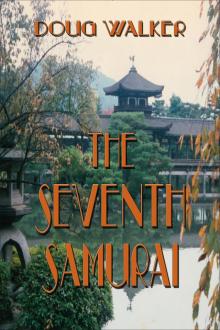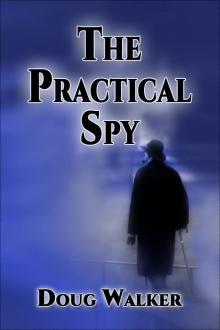- Home
- Doug Walker
The Seventh Samurai Page 2
The Seventh Samurai Read online
Page 2
The candles played odd figures on the cave walls, shadows dancing in silent exultation, the stale air, the smell of smoke and the body stenches of those long unwashed. It is a tradition of the Japanese to bathe frequently, but here was only the grunge and weariness of a defeated army, a dying army and a fading tradition.
The Colonel eyed the grim-faced group and inquired, "Which of you is the youngest?"
Yoshimoto was certain that he was. The others were veteran soldiers who had been through more than one campaign. Meekly, he pushed a hand to the level of his shoulder and said, "I think I am, Sir."
"Then it will be you," the Colonel said, "a soul unblemished by the years. There is a straight razor in my kit. I assure you it is sharp. Bring it here, then cut my throat with it."
Yoshimoto was frozen with fear. He would have preferred to run outside the cave and face the Marine guns rather than cut this man's throat. He considered bolting from the cave, but a deeper sense of duty held him back. He was after all Japanese and still an impressionable boy. Samurai stories danced in his head. Under the unflickering gaze of the Colonel, he slowly forced himself to rise from the cave floor, go to the Colonel's kit and find the cutthroat razor.
It was of German manufacture. The blade was flawless and glittered in the dancing fire flames of the candles. The boy returned to the Colonel's side and knelt on the cave floor, awkwardly holding what would become a bloody instrument of death.
The Colonel seemed almost in a trance, far removed from the cave, his thoughts straying to a time when a bold young lieutenant strolled with his bride-to-be beneath the cherry blossoms near the Imperial Palace. At length his spirit returned and his flame-flecked eyes seemed fully alert. "All right, son. You may cut my throat."
Yoshimoto had little recollection of what happened after that. The actual job was easier than he thought it would be, such was the sharpness of the blade. He cleaned the blood from his hands as best he could. Then he gulped sake. It was his first experience with the fiery beverage.
The others saw to it that he ate crabmeat from the small can. They were proud of him for performing his duty. Some of them dozed now and then because of too much sake, but none of them really slept that night. Among the other supplies in the cave were officers' swords. Half in jest the men talked of themselves as the legendary seven samurai to which the Colonel had referred.
As dawn turned the black sky gray, with the blankets over the cave mouth down, a sullen breeze ushered in a wretched morning. One soldier, holding a sword in his two hands, muttered, "There can be no death." Yoshimoto wondered what he meant. Were they not surrounded by death? Could one rise above death? Was death a welcome escape?
They had decided to use the swords in their attack against the dug-in Americans. They shared a sense of hopelessness and a night worn out by drinking had deadened their nerve ends to the point that they acted almost like robots, programmed to hold the swords and move as a body toward the waiting guns of the enemy.
Some had concealed hand grenades in their clothing. If wounded and facing capture they could blow themselves and their enemies into eternity.
Once outside the cave the men stumbled and staggered toward the Americans. When the first shot was fired, they picked up their cry of "banzai." In the face of automatic weapons it was short lived.
Yoshimoto stumbled, slashed himself on the right calf, then tripped, bashing his forehead against a rock and knocking himself senseless. Hours later he woke up, his head banging from an imperial hangover. His wounds were bandaged and a heavy cloth swathed the gash on his forehead. He was a prisoner behind enemy lines.
CHAPTER 3: Exit Ben Hardy
Sunday morning, Taro Watanabe and his girlfriend, Nana Liberman, were off to a festival in Sakai Higashi. They stood on the station platform enjoying the fine fall day. At the rear of the platform were a small valley and a cemetery, whose stones were tightly clustered to preserve space and house the bones of the dead.
Near the cemetery was a small house with a cheap tin roof, rather than the heavy tile roof so common in Japan. A woman in rice farmer's garb, a large cloth hiding her face, was pushing a wheelbarrow near the house. Beyond was a small shrub and tree nursery, and on a hill a couple of miles distant rose the huge brick complex of the Kinki teaching hospital.
Nana drew the usual stares from the others on the platform, her long straight taffy-colored hair, green eyes, a trim, athletic five-foot-seven, moderate bust, blue jeans and a mannish Oxford white shirt set her apart.
Watanabe was a shade taller than Nana and thoroughly Japanese in appearance except that his hair was on the sandy side. Looking over a large group of Japanese one finds jet-black hair of the raven variety is uncommon, except in very old women who get theirs from bottles. His hair was neatly trimmed as always, his eyesight good and his teeth white and - thanks to an orthodontist in the States - straight.
Nana seemed pensive and Watanabe feared she might still be brooding over a remark overheard from a nearby restaurant table the evening before. A Japanese had amused his male dinner guests with the remark that both women and Christmas cakes, central to the Japanese celebration of the holiday, were no good after twenty-five.
Watanabe sometimes wished that Nana had not bothered to learn Japanese. He had seen the glint in Nana's green eyes as her temper flared. She turned and shot a searing glance toward the nearby table. The man who had made the remark locked eyes with her for a short time before his smile faded and he turned away.
In the States, Nana had been a member of NOW and a spear carrier in numerous feminist causes. It was not always easy for her to live in a society where men could do little wrong.
She had been drawn to the island nation by the high wages available to those willing to work hard as English teachers, a sense of adventure and the chance to travel throughout Asia. What rankled her was the way most Japanese women accepted their inferior situation. In any office, or at any social gathering, they would fall all over each other to make green tea and to serve it to the men. She was blind to the fact that over the centuries Japanese women had carved their own niche in society, controlled the family budget and, in their own way, treated Japanese men like large, possibly dull, children.
Watanabe attempted to take these outbursts philosophically, often reminding himself of the Japanese saying, "Heavy rice bows low" - the greater your intellect, the greater your humility - although he sometimes wondered if thinking of himself as "heavy rice" contributed to his humility.
Because of his years in the United States, three of them on the Boston police force, and his fluency in English, he was often considered an outsider, a gaijin, by Japanese associates. He didn't dress like the Japanese and he didn't think like them and he didn't know all their arcane customs and beliefs. Sometimes, when down in the dumps, he felt he had the worst of two worlds. He also thought of himself as an outlet for Nana's anger, which usually vanished as soon as it was aroused by things Japanese.
They had been thrown together when a female friend of Nana's had been the victim in a bizarre samurai sword murder.
It had been almost a year since he had moved in with her, and their relationship, with notable exceptions, had been surprisingly good. Nana remained a free spirit. She would not be pushed or cajoled into the Japanese mold.
The very country of their residence was a problem, their contrasting cultures and personalities and always, just under the surface like the sadness in a Strauss waltz, the fact that Watanabe was married to someone else.
The electric train arrived and the two of them boarded. The trainman whistled, the doors slid closed and the big metal boxes moved down the tracks toward Sakai Higashi. The dark shadow of the train traveled with them at the exact speed. A spring-green rice paddy shot past, then a decaying brick factory and a crossing gate with three bicycles waiting to continue their journey across the tracks. There were standees on the train, old people, students, and lovers holding hands, most in casual attire for the festival. Billboards and tall concrete an
d steel apartments flashed by, the type some Japanese called rabbit warrens, then smaller stations. This was an express train. It would stop at Sakai Higashi, but it's base was the great station complex at Namba in the heart of Osaka.
Swaying with the rhythm of the train, Watanabe briefly filled Nana in on his conversation with Ben Hardy. "It's been three or four weeks since I talked with him and there seems to be something to his story. He lives somewhere in Sakai and I thought we might drop in on him today, just for a minute."
"Can't you just call him?" Nana questioned. "It's Sunday."
"That's the problem. I've been trying to get him for the last week. I get his machine. I didn't leave a message the first couple of times, but I have since. No response."
"Maybe he wants to forget about the whole thing. Do you think they'll ever find the other two bodies?"
"After all this time, I doubt it. But I need to get more information from Hardy. There's a piece missing somewhere."
The Sakai Higashi station was humming with activity. Shoppers were mixed with the festival crowd. Most people were in western dress, but here and there a splendid kimono produced an explosion of raucous color. At the bottom of the long escalator that led to the sidewalk, members of the local Lion's Club, in purple and yellow field caps and white outfits, conducted an anti-drug campaign, giving away small metric rulers with appropriate slogans.
Moving with the flow for a couple of blocks, Watanabe and Nana came to an almost American-style parade. Instead of people in happi coats carrying or dragging portable shrines, several large high school bands marked the beginning of Sakai as a seaport for western ships sometime in the 16th Century. One such band, made up of wooden flutes, was playing the U.S. Marine Corps hymn.
The street was dotted with stands selling ice cream, hot dogs, soft drinks and tako, a small round ball made with something like pancake mix and containing chopped up octopus. The vendors cooked them on a grill fueled by bottled gas, turning them expertly. Nana complained that the tako she had eaten never seemed to be quite done. There were also stands selling tiny live goldfish, Japanese rice sweets and the fine knives for which Sakai was renowned.
The city is also known as the burial place for the ancient rulers of Japan. From the air, green spaces can be seen marking the mysterious keyhole-shaped tombs that cannot be desecrated. It amounts to a scattering of parks imposed on a people who generally use every inch of urban space for commerce or housing.
Farther along a women's folk song and dance group, dressed in yukata went through stylized movements while holding blue towels. Nana announced she was hungry. They grabbed a cab and Watanabe directed it through a maze of tricky, narrow streets in search of an eel restaurant he had been to once in the dim past. After several wrong turns, the driver was all smiles when they found it, happy to be off the hook.
It wasn't much, just a narrow family-run restaurant on a mostly residential street. Nana asked what the name of the place would be in English. Watanabe studied the kanji and finally said, "Calm Happy Number."
"What the hell does that mean?" Watanabe shrugged and led the way inside.
As an appetizer they were given a small bowl of eel kidneys, although Watanabe explained that some restaurants of this type run short of eel kidneys and sometimes substitute kidneys from other sea creatures. Then came the main course, eel donburi, a bowl of hot rice with a little sauce and two slices of smoked eel. This was served with two slices of pickled daikon, the giant white radish, and a bowl of clear soup, which Watanabe said he thought was made with eel skin, but he wasn't sure. Watanabe was quite pleased with the meal, but Nana thought it was rather ordinary.
They managed to find another cab and went through another tortuous search, this time for Ben Hardy's apartment, through streets with no names and past houses and buildings with no consecutive numbering. Typical Japan.
After the trouble they had gone through, Watanabe was pleased that Hardy answered the door almost immediately.
"I've been trying to call you," Watanabe said.
It took Hardy a second or two to recognize Watanabe in this setting. He didn't seem particularly happy to see him. He looked from one to the other and finally said, "I've been trying to get away on a little trip. I'm sorry I didn't return your calls." He cast a puzzled eye in Nana's direction. Gaijin males married Japanese women, sometimes as a sham bride to mask another lifestyle, but it was a mixed up gaijin female who married a local. She didn't have the look of a loser.
"This is Nana Liberman," Watanabe said. "We've been at the festival. Thought I'd just drop by. I've had time to do some checking."
"Yeah," he nodded to Nana. "Well, it was a bad experience. I guess I'd be smart just to forget it."
"I know what you mean," Watanabe replied. "But maybe we could come inside for just a minute and go over some things."
"I wish I could, but the place is a mess. I'm just in the middle of packing and I've been too busy to clean. Maybe later on I could stop in, but I think the police up there at the Strait were right. It was just a fluke accident. I'm sorry I caused you any trouble."
"I'm sure it was an accident," Watanabe agreed. "But up until this time, all the information I've gathered backs you up. The body couldn't have possibly been carried by currents to where it was found. It would be like drifting upstream in a river."
"That's what it seemed like to me at first," a dour-faced Hardy said. "But you know ocean tides can reverse the flow of a river. We're dealing with a whole section of saltwater here and a bundle of tricky currents. I was still in a state of shock when I came to you. I just couldn't believe those three were dead. Now I accept it."
Nana nodded in agreement. "It's probably the hardest to say goodbye when you don't see someone. I mean, they were alive when they went under water. Then you just didn't see them again. I can see where it would be hard to accept that they're gone for good. Of course there was one body."
"Are you a cop too?"
"No Watanabe and I are friends." Hardy was likely the only foreigner in the neighborhood. From where Nana was standing on the street she had a clear view inside Hardy's narrow townhouse, a jumble of clothing thrown over a chair, an unmade futon and beyond, in the tiny galley kitchen, a counter littered with pots, pans and dirty dishes. Several empty beer bottles stood on the kitchen floor. The street itself was narrow and pure Japanese, gray water flowed in a partially covered ditch to one side. Sewage would go in underground tanks to be picked up periodically by vacuum trucks.
Hardy mulled what Nana had said, then responded, "You've got a good grip on the situation. 'Accept!' That's it. You come to accept the situation, then you say farewell. Goodbye. Sayonara. You close the book. I'm not saying I don't still think a bout it."
"Well, OK," Watanabe said. "I didn't come here for a philosophical conversation on how to handle grief. I am a policeman and I am conducting an investigation. And, say what you like about the currents, there's something amiss here and I intend to find out what it is."
"Far be it from me to stop your investigation," Ben said. "It's just that I'm going on this little trip. You told me yourself there was no hurry. We can get together when I come back."
"I guess that would be OK. You did start me down this road. Basically, all I want to do is go over the events of that day again. You laid it out for me before, but I didn't ask questions and I know quite a bit more about the situation now. So give me a buzz when you get back."
"Fine." Ben finally smiled. He thrust out a hand and shook first with Watanabe, then with Nana. "You'll hear from me within a day of my return. Nice talkin' to you both." He stepped inside and closed the door.
Monday morning, Nana made miso soup and rice for breakfast. She had no classes until the afternoon and they both liked a traditional Japanese breakfast now and again. The soup was made with fish flakes carved from a piece of bonito as hard as wood, salty miso and a few vegetables.
"What makes you think Ben Hardy will return to Japan?" Nana asked as she poured steaming green tea in
to two chawan.
"He said so," Watanabe shrugged. "Foreigners make frequent trips abroad."
"Not at this time," Nana said. "Universities and junior colleges aren't out until just before Christmas. I'm sure a guy like Hardy doesn't just work for language schools. In fact I think I've heard his name mentioned. I think he works at the women's college out toward Kobe."
"Mukogawa?"
"Yeah."
Watanabe scratched his chin. "Maybe he's just going to Hong Kong or Seoul for a couple of days."
"Well that doesn't make much sense, does it? There was some trash outside his place. Household stuff being thrown away."
"He's not the only one who lives there. Those places are jammed together."
Nana blew the steam from her tea. "I could see behind him through the doorway. There were more boxes inside."
Watanabe smiled. "You're playing policeman, aren't you? I have no reason to believe the man would lie to me. I'm going to treat him like he's perfectly honest until he proves otherwise. He's committed no crime that I know of."
"I'm not playing policeman," Nana said haughtily. "I'm just saying Hardy is leaving the country and you're never going to see him again."
"Patience is a characteristic of a good policeman and a national characteristic of we Japanese," Watanabe said. "Anyway, why didn't you tell me all this yesterday?"
"You were there. You know the university schedules. I'm not the detective, you are. I'm just another gaijin English teacher. Detect something!"
"Well, time will tell," Watanabe said, attempting to end the conversation.
"Yes, time and your Japanese patience. Which means do nothing, doesn't it? You could call the airlines and find out if he has a round-trip ticket."
"Sure, what airline should I call? When's he leaving?"
"You're the detective."
"It wasn't difficult for Watanabe to learn Ben Hardy's travel plans. It took time and a few phone calls. Hardy had been scheduled to fly out of Osaka that very afternoon. Had been scheduled. The scuba diver had changed his plans on Sunday afternoon. He had taken the Shinkansen train to Tokyo and caught the morning flight to Los Angeles.

 The King's Armada
The King's Armada The Seventh Samurai
The Seventh Samurai The Practical Spy
The Practical Spy The President's Ninja
The President's Ninja The Good Deed
The Good Deed An American Pope
An American Pope